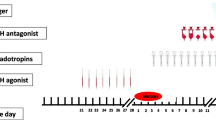Abstract
Purpose
To compare the effectiveness of using recFSH commenced in the luteal phase with a long GnRH agonist protocol or in the early follicular phase with a short GnRH agonist protocol, in infertile women designated as poor responders undergoing treatment with assisted reproduction in a prospective, randomized, controlled study.
Materials and methods
Forty-two couples undergoing an ICSI cycle of whom female partner diagnosed as poor responder were included in the study. Recombinant FSH was given daily from day 21 of the previous cycle upon initiation of GnRH agonist in the study group. Control group was given FSH on day 2 in a short protocol GnRH agonist regimen. The number of metaphase 2 oocytes was analysed as the main outcome measure; pregnancy rate and clinical pregnancy rate were secondary outcome measures.
Results
Patients in the study group had significantly higher number of metaphase 2 oocytes. Although not statistically significantly patients in the study group had higher pregnancy/clinical pregnancy rates, as well.
Conclusion
This preliminary study shows that luteal start of recFSH simultaneously with long protocol GnRH agonist in poor responder women produced better results comparing to short protocol GnRH agonist plus high dose FSH regimen.
Similar content being viewed by others
References
DeSutter P, Dhont M. Poor response after hormonal stimulation for in vitro fertilization is not related to ovarian aging. Fertil Steril 2003;79:1294–8.
Schipper I, Hop WC, Fauser BC. The follicle-stimulating hormone threshold/window concept examşned by different interventions. J Clin Endocrin Metab 1998;83:1292–8.
Mitchell C. Clinical gynecologic endocrinology and infertility, 6th ed. In: Leon Speroff Robert H. Glass, Kase NG, editors. Lippincott Williams and Wilkins, Baltimore, MD; 1999. p. 201–46.
Daya S. Gonadotrophin-releasing hormone agonist protocols for pituitary desensitization in in vitro fertilization and gamete intrafallopian transfer cycles Cochrane Database Syst Rev 1 2000. CD001299.
Rombauts L, Suikkari AM, MacLachlan V, Trounson A, Healy DL. Recruitment of follicles by recombinant human follicle-stimulating hormone commencing in the luteal phase of the ovarian cycle. Fertil Steril 1998;69:665–9.
Gougeon A, Testart J. Influence of human menopausal gonadotrophin on the recruitment of human ovarian follicles. Fertil Steril 1990;54:848–52.
Author information
Authors and Affiliations
Corresponding author
Additional information
Capsule: Luteal administration of recFSH along with GnRHa in poor responder women in an ART cycle increases metaphase 2 oocyte number significantly comparing to GnRHa flare-up protocol
Rights and permissions
About this article
Cite this article
Kucuk, T., Sozen, E. Luteal start of exogenous FSH in poor responder women. J Assist Reprod Genet 24, 635–638 (2007). https://doi.org/10.1007/s10815-007-9176-z
Received:
Accepted:
Published:
Issue Date:
DOI: https://doi.org/10.1007/s10815-007-9176-z




